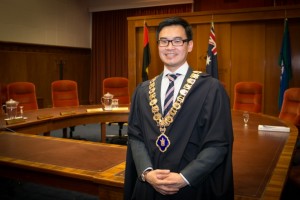Language, bigotry and racial stereotyping – the biggest barriers facing emerging communities

Cr Quach, Mayor of Maribyrnong
Australian-born Nam Quach speaks with a local drawl, barracks for the Western Bulldogs and is the mayor of Maribyrnong. But just last month he was disparagingly called a “Chinaman” and voters even questioned whether he spoke English.
This is a scenario facing many people from Melbourne’s emerging ethnic communities.
Recently elected as mayor, Cr Quach said perception and racial stereotyping are the things that disappoint him.
“Unfortunately this form of bigotry is something I’ve learnt to deal with since an early age and I try not to let it distract me from the bigger picture,” said Cr Quach.
“Racial stereotyping often means that people have judged and categorised you, before even thinking about what you are capable of, or what you are contributing,” he said.
But Cr Quach said opportunities do exist for those determined to succeed.
“I believe that positions of responsibility should never be based on race or ethnicity, moreover, merit, credibility and capability should be the key determinations.
“I think by and large, that the frameworks for equal opportunity do exist in our society, and I have been able to access these frameworks in the same way anyone else has, however I do feel that there is an under-representation of ethnic minorities in positions of responsibility,” he said.
According to Iraqi refugee Joseph Youhana, language is the biggest barrier preventing new arrivals from securing top jobs.
“Imagine you going to China and the whole system works in Chinese and you don’t speak Chinese at all,” he said.
While there is community support, it’s not enough to fill the gap, said Mr Youhana, a housing team leader at migrant settlement agency AMES.
But Melbourne University researcher Dr Berhan Ahmed disagrees. He backs Cr Quach’s view, saying perception is the biggest obstacle.
“The challenge is … people’s perception of a black person,” said Dr Ahmed, who made history in 2004 when he became the first Australian-African to stand for parliament.
“It’s hard to change perception in a very short time,” he said.
Dr Ahmed said it’s this perception that impacts on new arrivals’ employment opportunities.
“People judge others they don’t know [including] new migrants and refugees. New migrants are ‘us’. [We] look different, have different religion, different skin colour,” said Dr Ahmed.
“I am in a better position because I am outspoken. I speak, that helps. The problem is with people who have shyness who don’t have the language, and don’t have the culture, they find it is like an Everest to climb,” he said.
Another stumbling block for newly established communities is a lack of knowledge of “the system”, according to Mr Youhana.
“Established communities that have been here for years … receive twenty to thirty thousand dollars to maintain their clubs because they know the system,” he said.
“However those newly established communities need to have an easy focus and simpler mathematics to help them get these grants.”
Mr Youhana also laments the Iraqi community’s lack of local council representation. He said it had been represented by Turkish, Greek or Italian MPs.
“There is zero appearance at the government level. We are always represented by others,” said Mr Youhana.
“We need the refugees to have a voice. Because if you some of the local councils – they say they are multicultural but the representatives of the council are not multicultural and have no sense of what multicultural means,” he said.
“So how much will they know about a country… they will be influenced by negative media stories they have heard. But they haven’t experienced these things themselves so it’s not genuine,” he said.
Further he said there needs to be more collaboration between refugee communities and local government.
“We need to be part of the planning and the solution. If there’s a project to be done from the government to minimise this barrier, refugees need to be a part of it because we need to have a voice in that steering committee.
“These communities will be empowered by adding representatives to steering committees,” he said.
“Five years from now, they will no longer be newly emerged communities they will be part of the mainstream communities,” said Mr Youhana.
Cr Quach said the best way to tackle prejudice is at the community level.
“It is these bigoted perceptions and attitudes which we need to change. I think the best way to challenge and change this is through greater participation and engagement across all levels, to dispel innuendo, racial stereotyping and bigotry,” said Cr Quach.
Cesira Colleluori
AMES Staff Writer












